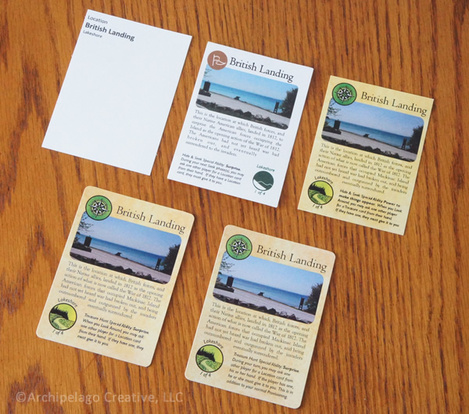How do you create new things? It seems to me that there are folks who can visualize a complete concept, then execute it. And then there are folks, like me, whose visualization of the final product is incomplete, so we have to produce many versions of the concept, each time changing something until you get to a satisfactory end result.
For example, here is a photo of most of the different versions of one card from Mackinac Island Treasure Hunt, from the earliest in the top left, to the latest in the bottom right:
For example, here is a photo of most of the different versions of one card from Mackinac Island Treasure Hunt, from the earliest in the top left, to the latest in the bottom right:
I’ve always been impressed with folks who can create without iteration: Someone who can sit down with a blank piece of paper or some time and walk away with a completed work. Fine artists and illustrators do this all the time. Musicians, too. Beethoven, for example, was famously deaf when he composed and premiered his Symphony No. 9., so he couldn't listen to it, tweak it, and try again.
But what’s really happening there is that they’ve just front-loaded their iteration: Musicians play scales or rudiments. Artists sketch or do studies. Beethoven was an amazing improviser, which must have been quite useful when he could no longer hear.
So, when trying something new, iteration is necessary. The artists that helped us work on Mackinac Island Treasure Hunt understood that, and were quite patient through the whole process. Earnest Hemingway wrote 47 endings to A Farewell to Arms. Now, to apply that patience to everything else!
But what’s really happening there is that they’ve just front-loaded their iteration: Musicians play scales or rudiments. Artists sketch or do studies. Beethoven was an amazing improviser, which must have been quite useful when he could no longer hear.
So, when trying something new, iteration is necessary. The artists that helped us work on Mackinac Island Treasure Hunt understood that, and were quite patient through the whole process. Earnest Hemingway wrote 47 endings to A Farewell to Arms. Now, to apply that patience to everything else!


 RSS Feed
RSS Feed